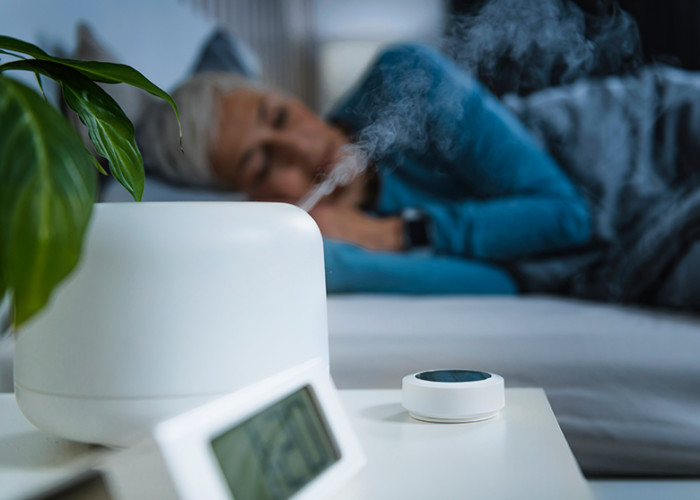Chronic Conditions
Tips for Communicating About Your COPD Diagnosis
Communicating about your COPD diagnosis can be easier with these steps
It began with your inner circle, those closest to you, and it has slowly been spreading outward to good friends and acquaintances. Communicating about your COPD diagnosis and knowing how to respond to the numerous questions that arise about it can be uncomfortable – for you personally, and also for those you’re speaking with as well.
Surprisingly, you might find that the biggest challenges come in speaking with your primary caregiving partner – the person who is closest to you personally. The caregiver/care receiver relationship can raise a number of emotions. The individual on the receiving end of care may feel insecure and self-conscious as a result of needing assistance, that may lead to feelings of anger and frustration just to name a few. The care provider … Read More »
Separate Truths From Myths About Hospice Care
Learn some of the most common myths about hospice care and the true facts about this incredibly beneficial form of care.
If you knew that a significantly better quality of life could be achieved for someone you care about, you would not think twice about exploring that option. Yet one of the most beneficial forms of care – hospice – is one that family members shy away from, due to many different misperceptions and myths about hospice care.
Hospice is meant to help someone with a life-limiting illness find respite from pain and other difficult symptoms, while obtaining comfort as well as spiritual and emotional support. Hospice care is provided night and day, both for the individual needing care as well as family members. And, for anyone covered by Medicare, hospice care is offered for a very low … Read More »
Not All Alzheimer’s Diagnoses Are the Same!
Alzheimer’s is increasingly common in older adults, but not all Alzheimer’s diagnoses are the same!
For many years, experts have been examining the advancement of Alzheimer’s through one basic model. Yet not all Alzheimer’s diagnoses are the same, presenting with a variety of symptoms and progression rates.
Now, however, a large, new collaborative study between the US, Canada, Sweden, and Korea is revealing some fascinating information to help us more accurately understand and treat Alzheimer’s disease. Rather than one universal, dominant diagnosis of Alzheimer’s, researchers have discovered that there are four unique variants that occur in as many as 18 – 30% of cases. This change in thinking is helping researchers more fully comprehend the variations in the disease from one person to another.
The findings are also significant in that they are allowing specialists to begin to … Read More »
Try These Fun Activities for Someone With Alzheimer’s and Vision Problems
If you’re struggling to come up with engaging activities for someone with Alzheimer’s and vision problems, give these ideas a try!
Finding meaningful, engaging ways to spend each day for a senior loved one with Alzheimer’s can be a challenge. Add in vision impairment, and it might seem overwhelming. Even so, it’s vitally important to ensure every day holds opportunities for purpose and joy – minimizing the level of agitation, frustration, and other difficult emotions and behaviors in dementia. If you’re coming up blank when trying to come up with these kinds of activities for someone with Alzheimer’s and vision problems, we have some suggestions you can try.
COVID-19 Delirium and Dementia: Is There a Link?
Find out what experts are saying about a possible link between COVID-19 delirium and dementia.
Just one of the numerous negative effects from COVID-19 is temporary delirium. As a matter of fact, two separate studies revealed that 55% – 65% of individuals who were severely ill from the virus experienced the acute confusion that is one of the trademarks of delirium – as compared to approximately 33% of those critically ill with other health conditions. And while it may be short-lived, the long-term effects are still being determined, including a possible link between COVID-19 delirium and dementia.
Are You Being Followed? How to Overcome Dementia Shadowing
If you’re the primary caregiver for someone with dementia, you may be quite familiar with the challenges experienced in trying to find a quiet moment or two alone – to use the restroom, take a quick shower, or even simply walk into another room. Seniors with dementia can experience heightened anxiety and fear when a loved one is out of sight – a condition known as shadowing. And the behaviors that result can be extremely difficult to manage: anger, crying, or repeatedly asking where you are, to name a few. If you’re struggling with how to overcome dementia shadowing, our dementia care experts have a few tips for you to try.
What Causes Dementia Shadowing?
It helps to understand the reasoning behind shadowing. You are the person’s safe place, the one who helps them to make sense out of … Read More »
Humidifiers for COPD: Helpful or Harmful?
Learn from our home care experts when and if humidifiers for COPD should be used.
For seniors and anyone else with a lung condition like COPD, maintaining the best possible air quality within the home is vitally important. But are humidifiers for COPD the right solution? The answer isn’t a simple yes or no. If the air is too dry, for example, it can cause or exacerbate health problems including:
Chapped, dry, or itchy skin
Nose bleeds
Dry eyes
Sore throat
Aggravated allergy, asthma, and cold/flu symptoms like congestion
And more
However, air that is too humid can cause mold and mildew to grow, which can lead to a host of health problems along with potential damage to the home.
Humidifiers, when used properly, can help maintain the ideal level of moisture in the air (between 30 and 50%), and in particular for those … Read More »
Understanding Parkinson’s Fatigue: It Feels Like “Walking Through Molasses”
Parkinson’s fatigue affects a person cognitively, physically, and emotionally.
Parkinson’s fatigue affects as many as one in two people with the disease, but until recently, we haven’t fully understood just how debilitating this condition actually is. A study is providing us with the insight we need to comprehend the impact of Parkinson’s fatigue, and what we can do to help someone experiencing it. Led by Duke University’s Sneha Mantri, MD, the goal of the research was to gain firsthand patient insights to know how to better address this challenging condition.
Three distinct areas of fatigue were investigated in the study: physical, emotional, and cognitive. Participants were asked to describe their level of fatigue, and the terms they used were quite revealing, including feeling unmotivated, overwhelmed, isolated, lacking energy, and as if they were “walking through molasses.”
Parkinson’s fatigue … Read More »
5 Ways to Calm Agitation in Alzheimer’s
Agitation in Alzheimer’s is common but can be eased with these tips.
Agitation in Alzheimer’s is one of the more difficult effects a senior may experience, and it can be incredibly hard for family members to manage. The key is in taking steps to handle agitation before it’s felt and expressed by the senior, which involves keeping track of what has brought about these feelings in the past, and creating a home environment in which those triggers are removed or minimized. These strategies can help:
Designate an area of retreat. When life begins to get stressful, having a specially created area for a senior loved one to go to de-stress can work wonders in restoring calm. This could be a separate room, or merely a comfortable corner with several soothing activities easily available, quiet music, a calming scent to … Read More »
Warning: These Common Medications May Increase Dementia Risk
Certain medications may now be linked to an increased dementia risk.
They are currently recognized to cause various short-term side-effects, for example, memory issues and confusion, but new research links some of the stronger anticholinergic drugs (like those prescribed for Parkinson’s disease, epilepsy, depression, and overactive bladder) to a markedly higher dementia risk.
The research involved two groups of seniors: 59,000 patients with dementia, and 225,000 without. Approximately 57% of those with dementia, and 51% without, were supplied a minimum of one (and up to six) potent anticholinergic medications. Considering other established dementia risk factors, the outcomes were an astounding 50% increased risk of dementia in individuals who were taking strong anticholinergics daily for three or more years, with the highest risk to people who received a dementia diagnosis before age 80.
It is critical to note that … Read More »

















